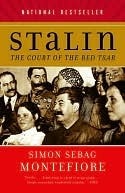More on this book
Community
Kindle Notes & Highlights
Read between
July 18 - September 9, 2018
‘Death solves all problems,’ Stalin is meant to have said. ‘No man, no problem.’ It was the Bolshevik way.*
The death toll of this ‘absurd’ famine, which only occurred to raise money to build pig-iron smelters and tractors, was between four to five, and as high as, ten million dead, a tragedy unequalled in human history except by the Nazi and Maoist terrors. The peasants had always been the Bolshevik Enemy. Lenin himself had said: ‘The peasant must do a bit of starving.’
Within three weeks of war, Russia had lost around 2,000,000 men, 3,500 tanks, and over 6,000 aircraft.
‘War is barbaric,’ reflected Stalin, ‘but using the A-bomb is a superbarbarity. And there was no need to use it. Japan was already doomed!’ He had no doubt that Hiroshima was aimed at himself: ‘A-bomb blackmail is American policy.’
As he told Chou at a later meeting, in a phrase that illustrates Stalin’s entire monstrous career, the North Koreans could keep on fighting indefinitely because they ‘lose nothing, except for their men’.
was now twelve hours since Stalin’s stroke and he was still snoring on the sofa, wet from his own urine. The magnates surely discussed whether to call doctors. It was extraordinary that they had not called a doctor for twelve hours but it was an extraordinary situation. This is usually used as evidence that the magnates deliberately left Stalin without medical help in order to kill him. But in their fragile situation, at a court already bristling with spymania against the killer doctors, it was not just hyperbole to fear causing panic. Stalin’s own doctor was being tortured merely for saying
...more
Perhaps 20 million had been killed; 28 million deported, of whom 18 million had slaved in the Gulags. Yet, after so much slaughter, they were still believers.


